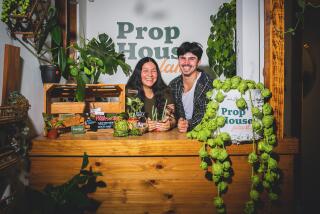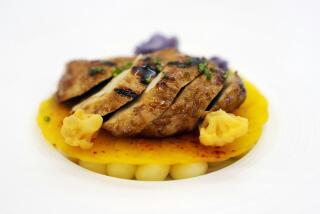Designer Genes a Good Fit at Santa Paula Lab
- Share via
On 20 acres of former orange groves on the edge of Santa Paula rise a laboratory and green houses that, according to the property’s new owner, may represent a quantum leap in plant propagation. The product: designer genes.
Twyford International of Somerset, England, took over the site in 1984. Its new subsidiary, Twyford Plant Laboratories, just completed its first full year of operation in which it shipped more than 1.2 million cloned plants to customers in California, Jeffrey N. Hooper, president of the parent firm, said in an interview. Worldwide, the company shipped 6 million cloned plants in its last fiscal year ended May 31 and expects to double that number this year.
The new head of the California operation named last month is Irwin Yaw-En Chu, a Japanese-trained expert in tissue culture and molecular biology. The company has a similar operation in Malaysia, giving it the global outlook that Hooper thinks is necessary to succeed in the emerging market for bioengineered agricultural products.
Plant tissue culture--the cloning of plants--greatly speeds the process of plant propagation while enabling scientists to improve plants by manipulating their gene structure to make them, for example, hardier and more productive. To replicate prize strains of tulips may take 15 years of traditional plant breeding, Hooper said, but using tissue culture can slash development time to two years.
“Genes will control disease to a far greater degree in the future than they do now,” Hooper predicted. “This will reduce the need for pesticides.”
The process, he acknowledged, is “somewhat more costly per unit” than traditional plant-propagation techniques, “but you get much better production.” Male lines of asparagus, for example, are more productive than female lines; cloned “supermale” asparagus plants enable farmers to increase production by 15%, he said.
“You place a tiny piece of a plant’s bud tissue in a sterile environment,” Hooper said, “and this multiplies in the right conditions of light and temperature and the right combination of chemicals and nutrient gel.” The result is production of identical offspring from a single strong parent. At Twyford’s lab in Somerset, for example, a single large banana tree has sent forth more than 1,000 clones in two years for sale to North Yemen.
Research is under way into cloning walnut trees. Ultimately, he said, farmers will be able to “reproduce the best of their orchards.”
Twyford employs 70 at its Santa Paula facility, he said, many of them former farm workers who have traded up for year-round, indoor work. Of the 50 members of the firm’s research-and-development staff, 20 hold doctorates, Hooper said.
A majority interest in the privately owned company is held by Plant Resources Venture Funds, a Boston investment group that specializes in agricultural biotechnology. Other major investors include Citicorp and New Enterprise Associates, in this country, and BAT Industries and Rothschild Inc. in the United Kingdom. A public offering may come in the next year.
Though still tiny--$7.2 million in revenue last year, compared to $300,000 in 1982 when Hooper joined the company--Twyford expects to continue to grow rapidly in the scramble after a piece of a global market estimated at $16 billion. Its ambition: Send out the clones of high-value products and latch onto a $2.5-billion slice of that market.
More to Read
Inside the business of entertainment
The Wide Shot brings you news, analysis and insights on everything from streaming wars to production — and what it all means for the future.
You may occasionally receive promotional content from the Los Angeles Times.










